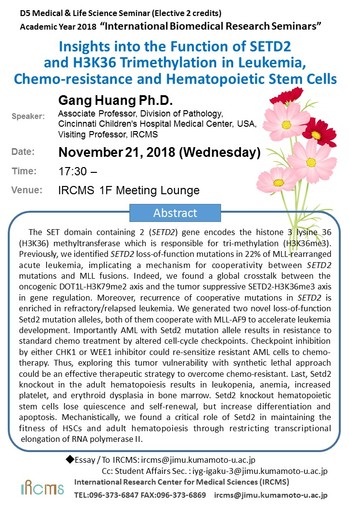- HOME
- News & Events
- [November 21]*D5 Medical & Life Science Seminar*
News & Events
[November 21]*D5 Medical & Life Science Seminar*
October 15 2018
The "D5 Medical & Life Science Seminar" course will be offered by International Research Center for Medical Sciences (IRCMS). It will run from May 2018 to March 2019, with lectures given by scientists affiliated or collaborated with the IRCMS. The course theme for this academic year is "Basic research for understanding disease mechanisms". The lectures will be given once a month, in English, and by leading scientists in the relevant research field. Students will be taught: 1) how normal physiological functions are maintained in human hematopoietic, vascular, immune, reproductive and nervous tissues and organs; 2) how abnormalities in these systems (e.g., cancer) are studied using experimental models; 3) cutting-edge technologies (including single cell level imaging and omics analysis) used for mechanistic understanding of these abnormalities; 4) efforts and progresses in finding cure for human diseases associated with these abnormalities; and 5) importance of understanding disease mechanisms using
Date : November 21, 2018 (Wed)
Time : 17:30 -
Venue : IRCMS 1F Meeting Lounge
Speaker : Gang Huang Ph.D.
Title : Insights into the Function of SETD2 and H3K36 Trimethylation in Leukemia,
Chemo-resistance and Hematopoietic Stem Cells
Abstract :
The SET domain containing 2 (SETD2) gene encodes the histone 3 lysine 36 (H3K36) methyltransferase which is responsible for tri-methylation (H3K36me3). Previously, we identified SETD2 loss-of-function mutations in 22% of MLL-rearranged acute leukemia, implicating a mechanism for cooperativity between SETD2 mutations and MLL fusions. Indeed, we found a global crosstalk between the oncogenic DOT1L-H3K79me2 axis and the tumor suppressive SETD2-H3K36me3 axis in gene regulation. Moreover, recurrence of cooperative mutations in SETD2 is enriched in refractory/relapsed leukemia. We generated two novel loss-of-function Setd2 mutation alleles, both of them cooperate with MLL-AF9 to accelerate leukemia development. Importantly AML with Setd2 mutation allele results in resistance to standard chemo treatment by altered cell-cycle checkpoints. Checkpoint inhibition by either CHK1 or WEE1 inhibitor could re-sensitize resistant AML cells to chemo-therapy. Thus, exploring this tumor vulnerability with synthetic lethal approach could be an effective therapeutic strategy to overcome chemo-resistant. Last, Setd2 knockout in the adult hematopoiesis results in leukopenia, anemia, increased platelet, and erythroid dysplasia in bone marrow. Setd2 knockout hematopoietic stem cells lose quiescence and self-renewal, but increase differentiation and apoptosis. Mechanistically, we found a critical role of Setd2 in maintaining the fitness of HSCs and adult hematopoiesis through restricting transcriptional elongation of RNA polymerase II.
